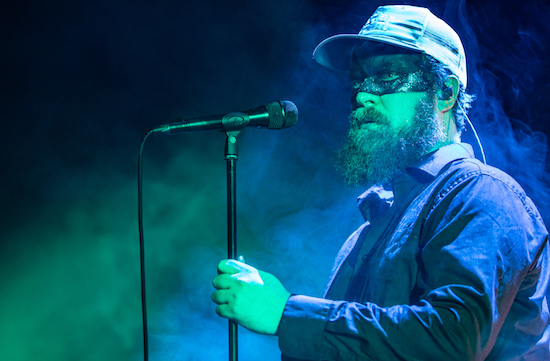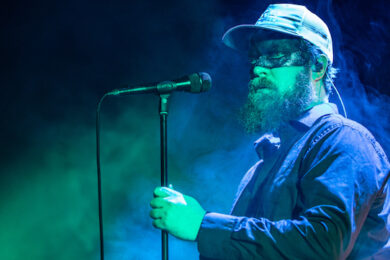Photos by Mike Burnell
John Grant is a ghost. He ghosted himself right out the womb and he’ll ghost himself into the tomb. Right now, he’s ghosted his way into the big theatres and the Top 20 of the albums chart – thrice – without anyone much noticing.
I met him once, without knowing it. At the 2013 Q Awards, after I’d completed my duties chaperoning Tinie Tempah around for the day, a mutual friend whisked me over to one of the tables and said “Simon, come and meet John.” John who? No idea. I was introduced to a chubby guy in his forties – hey, it takes one to know one – in an Iron Maiden T-shirt and a woolly hat. He was probably as nonplussed as I was while we exchanged pleasantries. I ghosted off to carry on chatting with someone I did recognise (Andy Partridge from XTC), and only figured out who the meaty metal fan was when I saw his photo in the magazine later.
That’s John Grant all over. Hiding in plain sight. Or plain, and hiding in sight. Because ‘plain’ is the word. Plain like ready salted crisps, at times. Plain like Virginia at others. But we’ll come back to that.
A recap for the unaware: John Grant is the 50-year-old synthesizer-loving singer-songwriter who was born in Michigan, grew up in Colorado with a Methodist family that disapproved of his sexual orientation and a mother who called him a “disappointment”, struggled with drug addiction, and released a number of little-discussed albums with The Czars before relocating to Reykjavik and releasing his solo debut, Queen Of Denmark, in 2010. At which point his name began to be dropped by tastemakers with increasing regularity and implied familiarity.
The first thing to say about John Grant and his backstory is that every tastemaker is a liar. “Oh, of course The Czars,” they bluffed through their teeth, when Queen Of Denmark took off. Reader, trust me. I know tastemakers. I’ve hung around with them and spent most of my life chatting shit about music with them. Arguably I’ve been one (although I vainly viewed myself more as a wrecker). And I can assure you that you never heard anyone namedrop The Czars in real time, only in retrospect. (It’s a curious phenomenon, this: real-life ‘Losing My Edge’ protagonists who suddenly claim to have always been into Liquid Liquid or Mission Of Burma or William Onyeabor or whoever this month’s example may be.)
To put this in London terms, The Czars played to 500 people at the Lyric in Hammersmith once in 2005 and that’s as good as it got, on a night when everyone who now claims to have been into them for donkey’s yonks was watching Beck round the corner at the Apollo. In 2018, John Grant has ghosted his way to playing to ten times as many at Brixton.
Someone with greater skills in web analytics, and more time on their hands than is healthy, could probably do a forensic study of the tipping point when John Grant went quietly viral, and identify the key influencers who made it happen.
The more recent landmarks are easier to chart. In 2014 Grant was nominated for a Brit Award and, of late, he has been directly pitched at the Radio 2 demographic. “I caught a bit of him supporting Elbow at the O2,” says a man conveniently within earshot, and definitely not a Cameron/Miliband-style fictional construct, to his friend as I traverse the lamplit Pavilion Gardens on the way to the Dome. All of which will have assisted his spectral ascent. But the way in which Grant’s became the name on so many lips at the turn of the decade is more unfathomable.
Understanding that, of course, would only give us the ‘how’. The ‘why’ is a bit easier to figure out, once you actually engage with his work. Not that he goes out of his way to hook you in. Even the aggressively normal name John Grant (it’s hard to think of a more whitebread, Anglo-Saxon stage name, with the possible exception of M Ward) seems calculated for maximum plainness. He could have gone for Paraplegic Alsatian, or Airport Yakuza, or anything, but no. John Grant. Like a bag of Salt’N’Shake before you’ve even opened the little blue sachet. Nor does he do much in the way of dress-up: with his beard and trucker’s cap, this big bear of a man (he doesn’t self-identify as a bear because he lacks the requisite chest-hair, but otherwise he ticks the box) looks more like a jolly butcher than a pop singer. Similarly his singing voice, almost devoid of vibrato will the very end of any given phrase, is just the right side of Wainwright dullness, but only just.
All of this determined ordinariness in John Grant’s presentation, however, means that the focus is on the songs. And, as a songwriter, John Grant perhaps has no equal currently. To characterise Grant as a ‘gay singer-songwriter’ is both insultingly reductive and bang on the money. He isn’t camp, and his songs aren’t rooted in the queer pop tradition of a heavy nod and a wink to the listener: he’s more inclined to write straight-up lines about openly eyeing up shirtless guys on skateboards. But nor would it be true to say that he writes universally applicable songs whose subjects/objects just happen to be male. Grant’s sexuality is a huge part of who he is as a human and an artist. And he’s very public about its consequences: he has spoken in interviews about his enthusiasm for bareback sex, and he announced that he is HIV positive while onstage with Hercules & Love Affair at the Meltdown Festival in 2012. It’s inseparable from his work. Grant writes specifically about the male ego and the gay experience. And he does it with such exquisite command of language that his songs have you straining your ears, lest you miss something vital.
You wouldn’t necessarily know that from the first couple of tracks in tonight’s set. ‘Tempest’, from the new album Love Is Magic, augments its retro-futurist Stranger Things synths with visuals from the classic Tempest arcade game, but the song’s meaning remains defiantly inscrutable. The album’s similarly electro-based title track rhymes ‘magic’ with ‘tragic’, and the heart sinks a little.
But Grant has earned the right to be cold and forbidding, diffident and aloof, even a little trite, if he so wishes, by writing songs that are the complete opposite. ‘Grey Tickles, Black Pressure’, for example, which perfectly expresses middle-aged confusion at the modern world, while being self-deprecating about what a first world problem that is: “There are children who have cancer… and so all bets are off, cos I can’t compete with that.”

That song’s “I can’t believe I missed New York during the 70s” is such a revealing line regarding Grant’s aesthetic palette and palate (even while the verse is actually about sexually transmitted diseases). His more lyric-heavy, piano-based compositions would have prospered if he’d come from New York or New Jersey in an era when his peers were Billy Joel, Dean Friedman and anyone called Randy. Despite the increasing presence of 80s trappings of his work, the 70s feel like his home decade. He’s more Newmanoid than Numanoid.
“I’m very happy to be starting the tour in Brighton,” he tells us. “That’s some good routing.” He’s forgiven the city, then. In 2013, his laptop – containing his “entire life” – was stolen from the lip of the stage during a show at St George’s Church in Kemp Town. In the circs, you’d understand if he chose to give B&H a swerve for ever. But the stages are that big bigger for Grant now, and security that bit better.
Reaching the age of 50 is preying on his mind, it seems. He spent his big birthday, he tells us, riding on insanely extreme rollercoasters next to Lake Erie and putting his bones through 135mph freefall, as if proving that he still can. And he mocks his own middle-aged hearing loss. “What?” he says to an unintelligible shout from a fan. “Yes, I would like a pasty. Cheese and onion.”
His band includes Budgie, an actual living Banshee, who does what is required of him magnificently (and a few per cent more). It’s a coup on a par with the various indie no-marks who have somehow snared the services of Johnny Marr since he left The Smiths, with the difference that Grant is an artist worthy of Budgie’s input.
Despite being a flesh-and-blood drummer, Budgie really comes into his own on the more electronic material, playing large rectangular pads. And there is plenty of that material. For example, ‘He’s Got His Mother’s Hips’, which is like Nine Inch Nails’ ‘Closer’ if it had lines about Colonel Mustard instead of animalistic shagging. Or ‘Smug Cunt’, the takedown of toxic masculinity during which Grant whips out a keytar. Or the bright, bleepy ‘Preppy Boy’, which is the closest Grant comes to Scissor Sisters territory and boasts a keyboard solo that sounds like a nuclear-powered Stylophone. Or the similarly dancefloor-ready ‘Black Belt’, featuring the marvellous word ‘callipygian’ which, as he explained to tQ’s Ian Wade in 2013, refers to well-shaped buttocks.
For all Grant’s namechecking of credible synth forerunners like Cabaret Voltaire, Devo and Yello, his material is often redolent of – and I genuinely mean this in a nice way – the dogshit detritus of 80s synth. Dave Stewart & Barbara Gaskin. Karel Fialka. Keith Marshall. It’s not cool, and it’s not uber-kitsch meme-fodder. The stuff that falls down the cracks in between: that’s where the action is now.
‘Queen Of Denmark’ still has the feel of a showpiece and a calling card. You won’t find many verses more explosively honest than: “You tell me that my life is based upon a lie / I casually mention that I pissed in your coffee / I hope you know that all I want from you is sex / To be with someone who looks smashing in athletic wear / And if your haircut isn’t right, you’ll be dismissed…” It’s also the song which, more than any other, makes sense of his kinship with Amanda Palmer (who guested on Grant’s ‘You & Him’ and covered his ‘Glacier’ with her father Jack). The intonation of the line “Can I please see your licence and your re-gi-stra… tion?” is pure Palmer.
Some things don’t quite come off. Like ‘Metamorphosis’, the one with the bleak line “14-year-old boy rapes 80-year-old man,” which Grant performs entirely in an annoying ‘Hey, I’m a quirky crazy guy!’ voice, like he’s channelling Emo Philips or Tiny Tim. Or the plodding and monotonous ‘Pale Green Ghosts’, which is just boring.
But for every one misstep, there are three or four songs as good as ‘Global Warming’, a song which casually drops the line “How am I supposed to live in a world with no Madeline Kahn / My favourite girl is gone…” Mentioning the comedy hero from Blazing Saddles, Young Frankenstein and Clue is such a brilliantly niche namedrop (though you never for a moment suspect that nicheness, rather than genuine affection, was the point). Or the lines “I’m so sick of hearing people talk about the sun / They sound like a bunch of Aztec Indians / And all they do is hang out clogging up the streets / Congratulating each other on their pedicured feet”. It’s the kind of lyric that rattles out more killer couplets before it’s even stretched its legs and warmed up than your favourite band has managed in their last three albums.
There are plenty more where that came from. There’s the fourth-wall-breaking ‘It Doesn’t Matter To Him’, very much Grant’s ‘Thank You For The Music’-meets-‘Wanted Dead Or Alive’. There’s ‘Is He Strange’, which echoes Atlantic Starr’s ‘Always’, of all things, in its cadences. There’s ‘Marz’, whose mournful mood drew the comment “my song when I suicide” from one fan underneath its video on YouTube. And, finally, there’s the uncomplicatedly heartfelt love song ‘Caramel’.
By the time he’s gone 20 minutes past the curfew, John Grant’s work has ghosted its way past your defences and earned your respect. Sure, he’s ‘plain’. Plain good.



